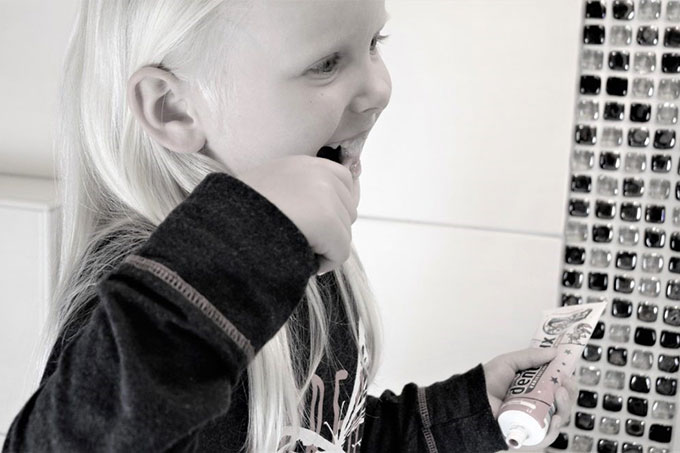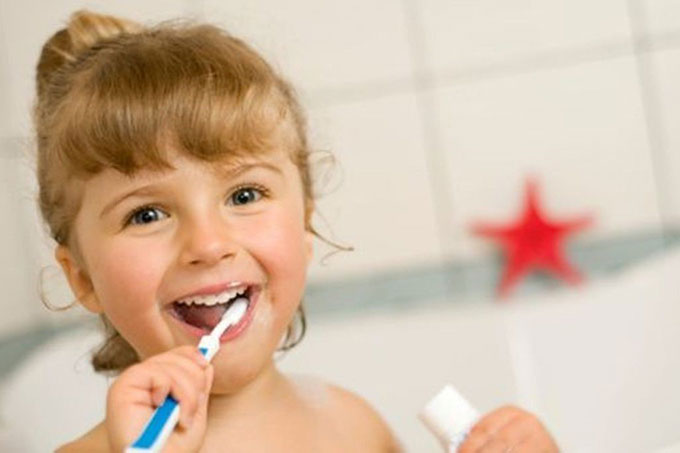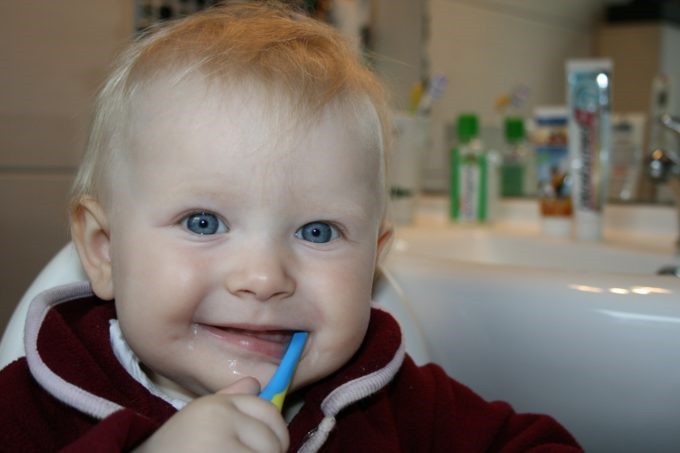Dental Care and Your Kids, a How-to Guide
When it comes to keeping your kids happy and healthy, dental care is a critical part of the process. Understanding that children’s baby teeth need outstanding care is the first step to promoting good dental habits that will last a lifetime.
Unfortunately, while many parents want to care properly for their children’s teeth, they aren’t sure how to do it, and this leads to misunderstandings that can damage dental habits down the road.
Ideally, good childhood dental care should start as soon as a child’s first baby teeth erupt, and should continue building from there. When you take this approach, it’s easier to build healthy dental habits, and ensure that kids and parents know how to care for young teeth at every phase of life. Here’s your guide to helping your kids keep their mouths healthy, starting right now:
Kids and Cavities: What Parents Need to Know

The first thing parents think of when they think of children’s dental health is likely cavities. While general dental decay rates have been decreasing for many years, there’s been a recent increase in dental disease among children. According to research conducted by the National Institute of Dental and Craniofacial Research, overall dental decay in children ages 2 to 11 decreased between the 1970s in the mid-1990s.
However, from the 1990s to 2004, there has been a significant increase in dental decay among children of this age group. Keep in mind that dental health in children is linked closely to income, race, and access to dental care. Luckily, all parents can take proactive steps to help cut down on dental decay among children. While it’s true that cavities are increasing, there are steps parents can take to banish them from their households.
Preventing Cavities and Dental Decay

Want to prevent cavities in your children? The first step is to ensure comprehensive, ongoing dental visits. Ideally, a child’s first visit to the dentist should occur within six months of the first tooth erupting in the mouth. While many parents have some anxiety about the first dental visit, it’s important to remember that you can hold your baby on your lap while the dentist examines him or her. Holding your baby in your lap may reduce dental anxiety in both parents and children and allows the dentist to check the child’s mouth for signs of decay. As the child grows up, Dental Care Providers will be able to work with you to establish healthy habits for preventing dental decay, tooth loss, and other dental problems.
Modeling Healthy Dental Habits

While ensuring your child sees the dentist regularly is an important step on the road to prevention, it’s also essential to remember that you are the first role model your child has when it comes to dental health.
With this in mind, make good habits the priority in your household. Make it a point of brushing and flossing your teeth before bed with your children, and do what you can to make dental care fun.
For example, you may choose to invest in a toothpaste that leaves a color on the teeth for the child to brush off, or for a mouthwash that features their favorite cartoon character. With children, incentivization is critical, and you may consider offering rewards for good dental habits or positive dental checkups. No matter what you have to do, remember that establishing healthy dental habits at a young age is the best way to ensure your child’s oral health throughout their life.
Bad Habits to Avoid
Good dental health is about what you do as much as it is what you don’t do. With that in mind, avoid these dental habits in your household:
- Not brushing. Whatever you do, don’t skip the brush sessions at night. Good dental hygiene is a habit, and refusing to skip late-night brush sessions is one of the best ways to support this habit. With this in mind, be sure to incentivize brushing every night. If you see a child skipping brushing his or her teeth, remind them gently and offer an incentive for getting the job done.
- Skipping dental visits. It’s impossible to maintain good oral hygiene if you’re not seeing the dentist regularly. With this in mind, prioritize Dental visits in your household. Even if you don’t understand how to care for your children’s teeth on your own, your dentist will be able to help you devise a plan for good oral hygiene that lasts a lifetime. What’s more, don’t be afraid to reach out to your dentist with dental questions between visits. They’re happy to help you establish good habits.
- Eating sugary snacks. Sugary and sticky snacks can have a detrimental impact on the teeth. With this in mind, limit. Instead, focus on nutritional and delicious items like fruits, leafy greens, and more.
- Opening things with the teeth. When a child gets a new toy, it’s understandable for excitement to take over. If that translates into your child ripping into the plastic with his or her teeth, though, there could be a serious issue. While the teeth are comprised of very strong biological material, they’re not a substitute for scissors, and children are likely to break, chip, or crack their baby or adult teeth if they start opening items with their teeth or biting into things they otherwise should not.
Good Dental Hygiene Starts Here

Dental hygiene is a family affair, and it’s much easier to promote good dental habits and kids if you model good dental habits yourselves. This is especially important when you have young kids around.
Because children don’t typically take charge of their dental hygiene without learning it from adults, it’s essential to model good habits early and give kids the information they need to understand how best to care for their teeth.
By starting when children are young, you can create an environment of dental responsibility and health in your home.
Don’t forget the dentist are your best outlet and source of information when it comes to sharing for your children’s dental health. Reach out with questions you may have, or request for assistance on a regular basis. Your dentist will be happy to help you and ensure that you get what you need to care for your children’s teeth starting early.
Our Team Will be Your Partner in Childhood Dental Health
Want additional help keeping your children’s’ teeth healthy? Have questions that need professional answers? Don’t hesitate to contact our team today! We’re here to help you ensure good dental health for your kids today and in the future.

